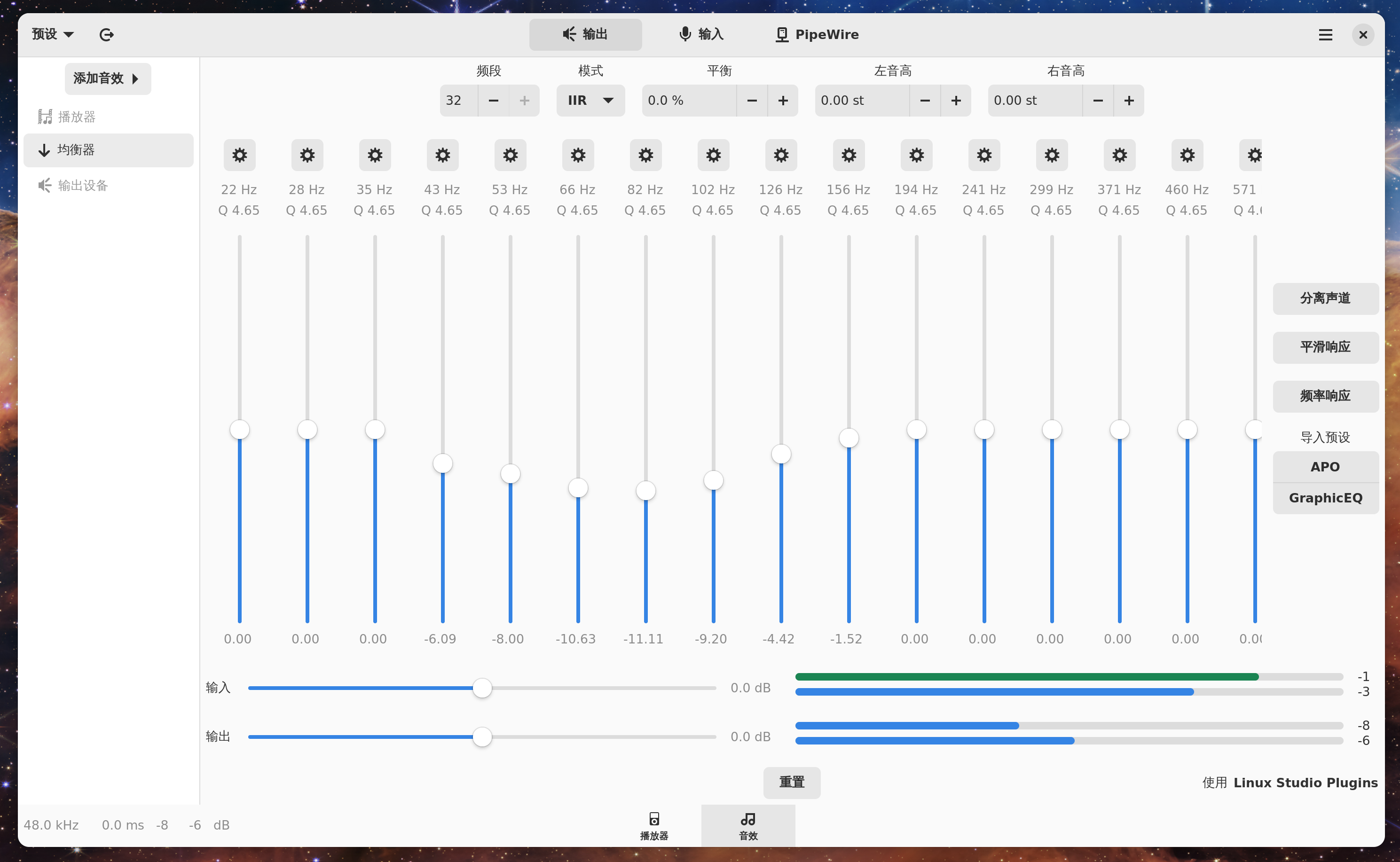我喜欢用本地文件听歌:没有广告、没有延迟、没有厂商锁定。但是有个问题:有的歌曲文件音量挺大的,比如 GARNiDELiA 和桃色幸运草Z的都感觉特别吵,需要调小音量,但有的音量又特别小,以至于我时常怀疑音频输出是不是出了问题。
这时候就要用到响度归一化了。响度衡量的是人的主观感知的音量大小,和声强——也就是声波的振幅大小——并不一样。ffmpeg 自带了一个 loudnorm 过滤器,用来按 EBU R128 标准对音频做响度归一化。于是调整好参数,用它对所有文件跑一遍就好了——我最初是这么想的,也是这么做的。
以下是我最初使用的脚本的最终改进版。是的,改进过好多次。小的改进如排除软链接、反复执行时不重做以前完成的工作;大的改进如使用 sem 并行化、把测量和调整两个步骤分开。之所以有两个步骤,是因为我要线性地调整响度——不要让同一个音频不同部分受到不同程度的调整。第一遍是测量出几个参数,这样第二遍才知道怎么调整。只过一遍的是动态调整,会导致调整程度不一,尤其是开头。
至于参数的选择,整体响度 I=-14 听说是 YouTube 它们用的,而真峰值 TP=0 和响度范围 LRA=50 是因为我不想给太多限制。
#!/bin/zsh -e
for f in **/*.{flac,m4a,mp3,ogg,opus,wma}(.); do
json=$f:r.json
if [[ -s $json || $f == *_loudnorm.* ]]; then
continue
fi
echo "Processing $f"
export f json
sem -j+0 'ffmpeg -i $f -af loudnorm=print_format=json -f null /dev/null </dev/null |& sed -n ''/^{$/,/^}$/p'' > $json; echo "Done with $f"'
done
sem --wait
for f in **/*.{flac,m4a,mp3,ogg,opus,wma}(.); do
json=$f:r.json
output=$f:r_loudnorm.$f:e
if [[ ! -f $json || -s $output || $f == *_loudnorm.* ]]; then
continue
fi
echo "Processing $f"
export f json output
sem -j+0 'ffmpeg -loglevel error -i $f -af loudnorm=linear=true:I=-14:TP=0:LRA=50:measured_I=$(jq -r .input_i $json):measured_TP=$(jq -r .input_tp $json):measured_LRA=$(jq -r .input_lra $json):measured_thresh=$(jq -r .input_thresh $json) -vcodec copy $output </dev/null; echo "Done with $f"'
done
sem --wait
不得不说 zsh 的路径处理是真方便。相对地,sem 就没那么好用了。一开始我没加 </dev/null,结果 sem 起的进程全部 T 在那里不动,strace 还告诉我是 SIGTTOU 导致的——我一直是 -tostop 的啊,也没见着别的时候收到 SIGTTOU。后来尝试了重定向 stdin,才发现其实是 SIGTTIN——也不知道 ffmpeg 读终端干什么。另外,给 sem 的命令传数据也挺不方便的:直接嵌在命令里,空格啥的会出问题,最后只好用环境变量了。
等全部处理完毕,for f in **/*_loudnorm.*; do ll -tr $f:r:s/_loudnorm//.$f:e $f; done | vim - 看了一眼,然后就发现问题了:有的文件变大了好多,有的文件变小了好多!检查之后发现是编码参数变了:mp3 文件全部变成 128kbps 了,而 flac 的采样格式从 s16 变成了 s32。
于是又写了个脚本带上参数重新处理。这次考虑到以后我还需要对单个新加的歌曲文件处理,所以要处理的文件通过命令行传递。
#!/bin/zsh -e
doit () {
local f=$1
local json=$f:r.json
local output=$f:r_loudnorm.$f:e
echo "Processing $f"
if [[ -s $json || $f == *_loudnorm.* ]]; then
else
ffmpeg -i $f -af loudnorm=print_format=json -f null /dev/null </dev/null |& sed -n '/^{$/,/^}$/p' > $json
fi
if [[ ! -f $json || -s $output || $f == *_loudnorm.* ]]; then
else
local args=()
if [[ $f == *.mp3 || $f == *.m4a || $f == *.wma ]]; then
local src_bitrate=$(ffprobe -v error -select_streams a:0 -show_entries stream=bit_rate -of json $f | jq -r '.streams[0].bit_rate')
args=($args -b:a $src_bitrate)
fi
if [[ $f == *.m4a ]]; then
local src_profile=$(ffprobe -v error -select_streams a:0 -show_entries stream=profile -of json $f | jq -r '.streams[0].profile')
if [[ $src_profile == HE-AAC ]]; then
args=($args -acodec libfdk_aac -profile:a aac_he)
fi
fi
if [[ $f == *.opus ]]; then
local src_bitrate=$(ffprobe -v error -select_streams a:0 -show_entries format=bit_rate -of json $f | jq -r '.format.bit_rate')
args=($args -b:a $src_bitrate)
fi
if [[ $f == *.ogg ]]; then
local src_bitrate=$(ffprobe -v error -select_streams a:0 -show_entries stream=bit_rate -of json $f | jq -r '.streams[0].bit_rate')
if [[ $src_bitrate == null ]]; then
src_bitrate=$(ffprobe -v error -select_streams a:0 -show_entries format=bit_rate -of json $f | jq -r '.format.bit_rate')
fi
args=($args -b:a $src_bitrate)
fi
if [[ $f == *.flac ]]; then
local src_sample_fmt=$(ffprobe -v error -select_streams a:0 -show_entries stream=sample_fmt -of json $f | jq -r '.streams[0].sample_fmt')
args=($args -sample_fmt:a $src_sample_fmt)
fi
ffmpeg -loglevel error -i $f -af loudnorm=linear=true:I=-14:TP=0:LRA=50:measured_I=$(jq -r .input_i $json):measured_TP=$(jq -r .input_tp $json):measured_LRA=$(jq -r .input_lra $json):measured_thresh=$(jq -r .input_thresh $json) $args -vcodec copy $output </dev/null
touch -r $f $output
fi
}
for f in "$@"; do
doit $f
done
然后我就神奇地发现,sem 不好用的问题突然没有了——我直接 parallel loudnorm ::: 文件们 就好了嘛……

